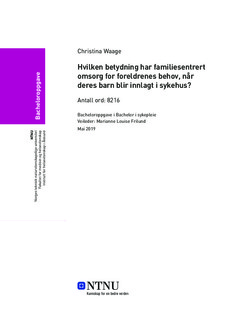| dc.contributor.advisor | Frilund, Marianne Louise | |
| dc.contributor.author | Waage, Christina | |
| dc.date.accessioned | 2019-09-06T14:10:29Z | |
| dc.date.available | 2019-09-06T14:10:29Z | |
| dc.date.issued | 2019 | |
| dc.identifier.uri | http://hdl.handle.net/11250/2613488 | |
| dc.description.abstract | Bakgrunn: Forskning i Norge og andre land viser at familiesentrert omsorg styrker fysisk og psykisk helse hos foreldre og det syke barnet. Inkludering av foreldrene er lovgitt i Norge, noe som plikter sykepleiere å tilrettelegge for dette.
Hensikt: Hensikten med studien er å undersøke hvordan familiesentrert omsorg kan ivareta foreldrenes behov når deres barn blir innlagt i sykehus. Det diskuteres også i noen grad hvilken effekt familiesentrert omsorg har for barnets tilhelingsprosess.
Metode: Denne systematiske litteratursstudien, baseres på åtte forskningsartikler derav fem kvalitative studier, to med kombinert metode og en kvalitativ tverrsnittstudie.
Resultat: Gjennom analysen kom det frem hvordan familiesentrert omsorg ivaretar foreldrenes behov når deres barn blir innlagt i sykehus. Foreldre som ble sett, inkludert og involvert i pleien rapporterte mer tillit og trygghet til helsepersonell. Foreldrene var også mer tilfredsstilte med behandlingen av det syke barnet. Foreldre som ikke opplevde tilretteleggelse for familiesentrert omsorg rapporterte i større grad misnøye, frustrasjon og usikkerhet.
Konklusjon: Familiesentrert omsorg er av stor betydning fordi det styrker fysisk og psykisk helse både hos foreldrene og det syke barnet. Omsorgsfilosofien samsvarer også med behovene som foreldrene ga utrykk for. Familiesentrert omsorg viser seg å være den beste tilnærmingen for å oppfylle behovene til foreldrene og det syke barnet, samt redusere lengden på sykehusoppholdet. | |
| dc.description.abstract | Background: Research in Norway and other countries shows that Family-centered care strengthens physical and mental health among parents and the sick child. The inclusion of parent is required by law in Norway, which obliges nurses to facilitate this.
Purpose: The purpose of this study is to investigate how family-centered care can meet the parents needs when their child is admitted to hospital. The study also discusses the effect of family-centered care has on the child’s healing process.
Method: This systematic literature study is based on eight research articles; five qualitative studies, two combined method and one qualitative cross-sectional study.
Results: Through the analysis, it emerged how family-centered care takes care of the parents needs when their child are hospitalizes. Parents who were seen, included and involved in the care, reported more confidence and security to health professionals. The parents were also more satisfied with the treatment of the sick child. Parents who did not experience facilitation for family -centered care reported dissatisfaction, frustration and uncertainty.
Conclusion: Family-centered care is of great importance because it strengthens physical and mental health both with the parents and the sick child. The care philosophy also matches the parent’s needs. Family-centered care proves to be the best approach to meeting the needs of the parents and the sick child, as well as reducing the length of hospital stay. | |
| dc.language | nob | |
| dc.publisher | NTNU | |
| dc.title | Hvilken betydning har familiesentrert omsorg for foreldrenes behov, når deres barn blir innlagt i sykehus? | |
| dc.type | Bachelor thesis | |
